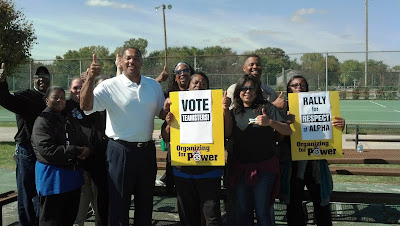 |
| Demanding change yesterday in Crestwood, Ill. |
Steven Ashby thinks that might be happening. Writing in the Chicago Tribune, he points to teachers' strikes in Chicago and suburban Lake Forest, a walkout by Chicago symphony musicians, machinists on picket lines in Joliet and Wal-Mart warehouse workers striking in Elwood. (He could have mentioned the Alpha bus workers rallying for respect yesterday in Crestwood.)
Before that, there was a massive uprising in Wisconsin, the stunning defeat of an anti-union law in Ohio and Occupy Wall Street.
Ashby concludes There's something happening here:
Before that, there was a massive uprising in Wisconsin, the stunning defeat of an anti-union law in Ohio and Occupy Wall Street.
Historical change is often best understood by looking at turning points — key moments when history began to dramatically change. Three citywide labor strikes in 1934 ended a period of relative passivity and heralded the country's largest and most successful worker uprising. The 1955 Montgomery bus boycott initiated the nation-changing civil rights movement.
So are Wisconsin, Occupy and the CTU strike another turning point that future historians will see as the beginning of a new mass workers' movement demanding social change?
If I was a betting man, I'd put my money on it. One key ingredient in the making of historical turning points is that people begin to view street protests as normal instead of weird. Instead of viewing a mass march on TV or the occupation of a building as strange and scary, many people watch those same events and think to themselves, "Good for them. That's what it takes to get anything done in this country. Maybe I'll join them."Read the whole thing here.
